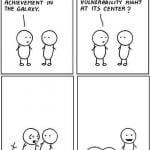I recently replaced the vacuum breaker on an outdoor anti-siphon spigot. There was a time when that sentence would have seemed not only implausible but as incomprehensible as a discussion of the ontological ramifications of perichoretic symbolism on Romanian Orthodox iconostases sounds to most people.
But the faucet was leaking, and so I got on YouTube and learned what I needed to do. And I did it.
In the past, unless one had been apprenticed in such skills, one simply had no way of knowing them. So when a crisis appeared, you called an expert.
In recent years, libraries have shifted away from stockpiling rare volumes “just in case” they are needed, as newer technological options have allowed them instead to rely on networks of lending and purchasing providers through which needed items can be acquired “just in time.”
After repairing the spigot, I tried to forestall the likely quip from my wife by volunteering the opinion first. Who would have thought that I would ever be the kind of husband that did outdoor plumbing repairs? Not her and not me. But as my wife insightfully observed, YouTube has changed things.
I wonder what the world of higher education will look like as we move in the direction of “just in time” learning and training. There are certainly domains in which we will still expect or need knowledge in advance of when it is strictly needed or required. There are likewise subjects that it requires many books to even begin to understand.
But it is important that higher and indeed all levels of education grapple with the question of what still requires a 4-year degree and what requires access to crowdsourced knowledge in videos. How we learn is changing, just as what and how we read is changing.
There are several takeaways from reflecting on this. One is that one needs to acquire certain skills if one is to be able to take full advantage of on demand educational resources. Without strength and tools one will be unable to proceed as well, but even if one has certain crucial general resources, some specific knowledge may be required. One can use YouTube to improve fluency in a language but unless one has prior knowledge of the language then you will not achieve fluency in a short span. You cannot go from no knowledge of HTML to building a website overnight. There is greater potential for training and learning to happen when they are needed, but all learning depends on some prior knowledge. Another key point is that there will always be a need for experts, since few are going to have the time to learn to undertake a major project, to carry it out in the much longer time frame it takes someone without experience, and be as satisfied with the results as they would be with the work of professionals. Finally, information literacy is crucial, since there is probably as much dubious information about plumbing on the internet as there is about subjects like religion, medicine, and history.
What things have you learned and done that you never thought you would, thanks to the internet era of crowdsourced knowledge and video tutorials?
Of related interest, see the IHE article on what bike mechanics and professors have in common.













